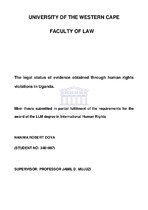| dc.contributor.advisor | Mujuzi, Jamil. D | |
| dc.contributor.author | Doya, Nanima Robert | |
| dc.date.accessioned | 2016-04-15T14:43:48Z | |
| dc.date.available | 2016-04-15T14:43:48Z | |
| dc.date.issued | 2016 | |
| dc.identifier.uri | http://hdl.handle.net/11394/4925 | |
| dc.description | Magister Legum - LLM | en_US |
| dc.description.abstract | The Constitution 1995 of the Republic of Uganda is silent on how to admit evidence obtained through human rights violations in Uganda. The decided cases are inconsistent in the way courts have dealt with this evidence. This research establishes how jurisdictions like South Africa, Canada, Kenya, Zimbabwe and Hong Kong deal with evidence obtained as a result of human rights violations. It establishes the position of international law on evidence obtained through human rights violations. The research then employs the comparative study to establish the status of evidence obtained through human rights violations in Uganda. This study helps in the improvement of the practice of evaluating evidence in courts, by providing recommendations to policy makers and judicial officers in the criminal justice system on how to handle evidence at the pretrial stages in order to greatly attempt to contain the consequences of this evidence. | en_US |
| dc.language.iso | en | en_US |
| dc.publisher | University of the Western Cape | en_US |
| dc.subject | Human rights violations | en_US |
| dc.subject | Administration of justice | en_US |
| dc.subject | Uganda | en_US |
| dc.subject | South Africa | en_US |
| dc.subject | Kenya | en_US |
| dc.subject | Zimbabwe | en_US |
| dc.subject | Evidence | en_US |
| dc.title | The legal status of evidence obtained through human rights violations in Uganda | en_US |
| dc.type | Thesis | en_US |
| dc.rights.holder | University of the Western Cape | en_US |

